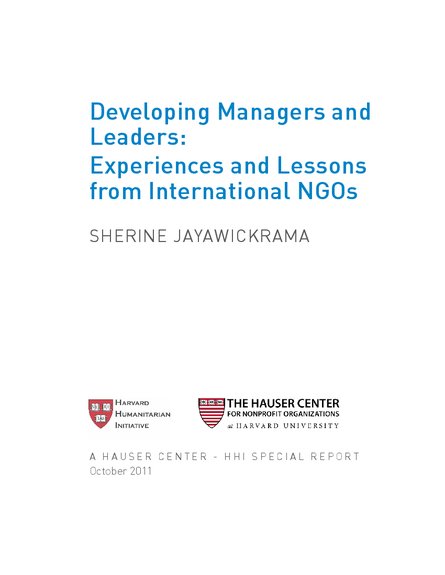
The origins of most international non-governmental organizations (INGOs) are rooted in an idealistic mission and a strong volunteer spirit. Over the years, these INGOs have grown larger and have become stewards of substantial financial resources. For example, World Vision International now has an annual global budget exceeding $2 billion. INGOs’ approaches have become more sophisticated and public expectations of their performance and impact have also increased. This challenges INGOs to become more professional, well-managed organizations. Many people working in INGOs today are still driven more by a sense of mission than by financial compensation. Therefore, INGOs must recruit, develop and retain high-quality staff (including good managers and leaders) while creating space for staff to fulfill their sense of mission.
This paper – a collaboration of the Hauser Center for Nonprofit Organizations and the Harvard Humanitarian Initiative – is an exploration of how INGOs approach the development of managers and leaders. It discusses the context, practice and lessons related to management and leadership development in a handful of large INGOs focused on humanitarian and development efforts. For the past decade or so, INGOs have been paying increasing attention to developing managers and leaders. This has resulted in a myriad of efforts not only within individual organizations but also across organizations (via coalitions and joint initiatives). For-profit and nonprofit academic
This paper is written by Sherine Jayawickrama, Domain Manager, Humanitarian & Development NGOs at the Hauser Center for Nonprofit Organizations at Harvard University. Fifteen interviews were conducted by Israel Keys and the remainder was conducted by Sherine Jayawickrama. The author thanks Israel Keys, Peter Bell, Aviva Argote, Vincenzo Bollettino and Sasha Chriss for their comments on drafts of this paper. This paper was prepared with the generous support of The Harbor Lights Foundation.institutions and consulting firms also increasingly provide management and leadership development services to INGOs. This paper takes stock of some of these efforts, drawing lessons from these diverse experiences and identifying challenges for the future. It is written both for INGO staff seeking a broad, comparative view of the issues, experiences and lessons related to management and leadership development in INGOs, and for scholars and consultants seeking an understanding of management and leadership development needs and challenges in INGOs.
The paper is organized into seven sections: first, an overview of the methodology; second, an overview of the broad landscape of management and leadership development in the INGO sector; third, the context for management and leadership development within INGOs; fourth, some promising management and leadership development approaches drawn from specific INGOs; fifth, a discussion of common threads across various INGO experiences and emerging challenges; sixth, an examination of key lessons learned and priorities for the future; and, finally, a brief conclusion.
